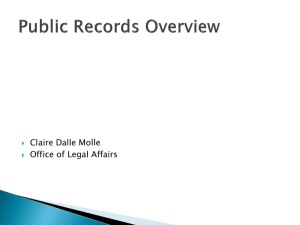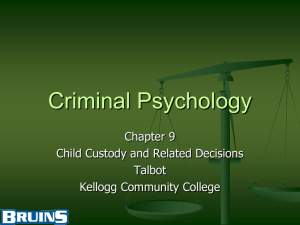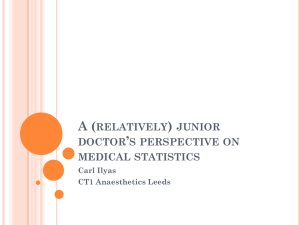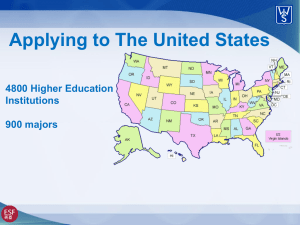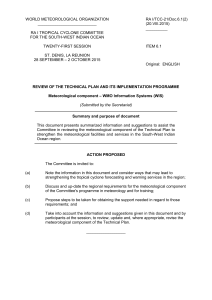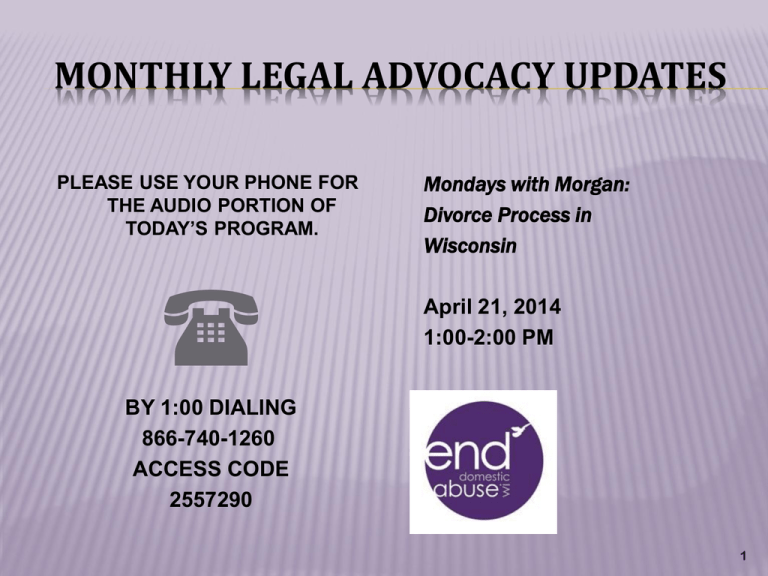
MONTHLY LEGAL ADVOCACY UPDATES
PLEASE USE YOUR PHONE FOR
THE AUDIO PORTION OF
TODAY’S PROGRAM.
Mondays with Morgan:
Divorce Process in
Wisconsin
April 21, 2014
1:00-2:00 PM
BY 1:00 DIALING
866-740-1260
ACCESS CODE
2557290
1
DIVORCE
IN
WISCONSIN
Morgan Young
End Domestic Abuse WI
morgany@endabusewi.org, 608.255.0539
TODAY’S PRESENTATION
Basic Divorce Process
Required paperwork
2003 Wisconsin Act 130
Role of the Mediator and Guardian ad Litem
Role of the advocate
BASIC REQUIREMENTS FOR DIVORCE
Legally married person (anywhere in the world)
Who has resided in the State of WI for at least 6
months and in the county where filing for at least 30
days
In order for the court to have jurisdiction over
children, they must also have resided in the state at
least within the six months prior to filing or currently
reside in the state
HOW TO START DIVORCE ACTION
Prepare the pleadings: Summons, Petition,
Confidential Petition Addendum (Wis. Stats. Sec.
767.215)
File the pleadings with the Clerk of Courts for the
county where filing with the appropriate filing fee or
fee waiver
Service of Process (Wis. Stats. Ch. 801)
TEMPORARY ORDERS
(WIS. STATS. SEC. 767.225)
To schedule a Temporary Order Hearing:
File an Order to Show Cause for Temporary Order and Supporting
Affidavit
Personally serve the other party with these papers
Each party is typically required to fill out a Financial Disclosure
Statement at this time (Wis. Stats. Sec. 767.127)
Temporary Orders are to resolve matters of legal
custody and physical placement of minor children,
child support, and other financial matters during the
pendency of the divorce and are typically heard in
front of the County’s Family Court Commissioner
LEGAL CUSTODY OF CHILDREN
“Legal Custody” means the
right and responsibility to
make major decisions
concerning the child. (Wis.
Stats. Sec. 767.001(2)(a))
Other factors the court uses
in determining custody and
physical placement are
found in (Wis. Stats. Sec.
767.41(5))
“Major decisions” includes,
but is not limited to,
decisions regarding consent
to marry, consent to enter
military service, consent to
obtain a motor vehicle
operator's license,
authorization for
nonemergency health care
and choice of school and
religion. (Wis. Stats. Sec.
767.001(2m))
JOINT LEGAL CUSTODY
“Joint legal custody” means that both parents
share legal custody and neither parent's legal
custody rights are superior. (Wis. Stats. Sec.
767.001(1s))
It presumes that parents are able to
communicate and jointly make major
decisions.
“IMPASSE BREAKING AUTHORITY”
In making an order of joint legal custody, the court
may give one party sole power to make specified
decisions, while both parties retain equal rights and
responsibilities for other decisions. (Wis. Stats. Sec.
767.41(6)(b))
In essence, this gives one parent the right to make the
final decision when the parties cannot agree on a
custodial decision.
SOLE LEGAL CUSTODY
One parent has the legal custody of the child. (Wis. Stats.
Sec. 767.001(6))
The court may order sole legal custody to one parent by
agreement of the parties or due to any of the following:
One party is not capable of performing parental duties and
responsibilities or does not wish to have an active role in raising
the child.
One or more conditions exist at that time that would
substantially interfere with the exercise of joint legal custody (i.e.
an injunction prohibiting one parent from having any contact
with the other).
The parties will not be able to cooperate in the future decision
making. (Included in this is the rebuttable presumption that if
either party engaged in abuse of the child, interspousal battery,
or domestic abuse, the parties will not be able to cooperate in the
future decision making. (Wis. Stats. Sec. 767.41(2)(b)2)).
PHYSICAL PLACEMENT
(WIS. STATS. SEC. 767.41(4))
The court may award primary physical placement of
the child to one parent, with secondary physical
placement to the other, or a form of shared physical
placement to both parents.
Primary placement =
>75% annual overnights
with the primary
placement parent
Shared placement = 25% 50% annual overnights
with one parent and 75% 50% annual overnights
with the other parent
2003 WISCONSIN ACT 130
Pursuant to 2003 Wisconsin Act 130, as it is written
into Wis. Stats. Sec. 767.41, the court may grant sole
legal custody and/or primary physical placement to a
victim of interspousal battery or domestic abuse.
(See Wis. Stats. Sec. 767.41 generally)
WHEN IS THE BEST TIME TO RAISE
DOMESTIC VIOLENCE CONCERNS?
The sooner, the better, as domestic abuse is a
statutorily created factor the court must consider in
custody and placement orders.
For example, at the Temporary Order stage, the
Family Court Commissioner should take domestic
violence concerns into account when making
temporary orders.
WHEN WILL A GUARDIAN AD LITEM BE
APPOINTED? WHAT ABOUT MEDIATION?
Whenever there is a dispute regarding the custody
and physical placement of the minor child, the court
will refer the matter for mediation and a family court
study. (Wis. Stats. Sec. 767.405(8))
If the dispute continues after mediation, the court
waives mediation, or the court is concerned for the
welfare of the child, a Guardian ad Litem (“GAL”)
shall be appointed. (Wis. Stats. Sec. 767.405(12)(b)
and 767.407)
MEDIATION AND DV
Wisconsin statute allows those who have
safety concerns to waive the ordered
mediation
This looks different in different areas
A good mediator will do a screening for DV and
make accommodations as necessary if the
survivor wishes to proceed or the waiver is not
accepted
WHAT IS THE ROLE OF THE GAL?
The GAL shall be an advocate for the best interests of a
minor child. (Wis. Stats. Sec. 767.407(4))
The GAL shall consider the factors under Wis. Stats. Sec.
767.41(5)(am) and conduct an investigation as to what is in the best
interest of the minor child.
The GAL shall investigate whether there is evidence that either parent
has engaged in interspousal battery or domestic abuse and shall
report to the court on the results of the investigation.
To make a recommendation to the court as to what s/he believes is in
the child’s best interest.
To present evidence at a trial/hearing to support her/his
recommendation.
ABOUT THE GAL…
In WI, GALs are attorneys…. Not necessarily social workers
are those trained in children’s development
GALs must be ready to litigate cases
All court-appointed GALs are required to have *some*
domestic violence training as part of his/her certification
GALs are NOT required to meet with the children, nor is it
necessarily a best practice to do so
It is extremely difficult to get GALs removed from a case
once they are appointed and have started work
THE PROCESS
LOOKS DIFFERENT
IN DIFFERENT COUNTIES!
DANE, JEFFERSON, RACINE, WAUKESHA
COUNTIES
Dane, Jefferson, Racine, and Waukesha Counties
have Family Court Counseling Services (FCCS)
offices. The counselors/social workers conduct
mediation and the family court studies, in the
event that mediation fails. The assigned worker
also assists the GALs in investigating and can serve
as witnesses at trial.
Racine County has a specific number of GALs on
contract. Dane County has a specific number of
GALs on contract, but only for non-divorce cases.
MILWAUKEE AND ROCK COUNTIES
Milwaukee and Rock Counties have mediation offices
in their courthouses, but no counselors who can
conduct the family court studies.
Therefore, when a GAL is appointed, that person is
responsible for conducting the investigation and
writing recommendations to the court. Rock County
has a specific number of GALs on contract.
KENOSHA COUNTY
Kenosha County utilizes an outside mediation agency
called Interconnections. They have no Family Court
Counseling Services, and therefore, no counselors
who can conduct the family court studies.
Therefore, when a GAL is appointed, that person is
again responsible for conducting the investigation
and writing recommendations to the court. Kenosha
County has a specific number of GALs on contract.
AND THEN WE WAIT….
STATUTORY WAITING PERIOD FOR FINAL
HEARING OR TRIAL
The expiration of 120 days after service of the
summons and petition upon the respondent or
the expiration of 120 days after the filing of the
joint petition, unless emergency reason for an
immediate hearing exists.
(Wis. Stats. Sec. 767.335)
THE PROCESS
LOOKS DIFFERENT
IN DIFFERENT COUNTIES!
DANE COUNTY PROCEDURE
Family Court Commissioner has to certify the
case over to the Judge
Judge conducts a pretrial/status/ scheduling
conference with all parties and attorneys
Trial or stipulated divorce date is scheduled
OTHER COUNTIES’ PROCEDURE
Attorneys schedule a pretrial hearing or the
Judge’s clerk mails out a court date notice for a
pretrial hearing
Court issues pretrial orders
Trial or stipulated divorce date is scheduled
Some counties will schedule a stipulated final
hearing without a pretrial conference – it’s the
judge’s discretion
DIVORCE TRIAL/HEARING
If contested:
Rules of Civil Procedure apply (See generally Wis.
Stats. Sections 801 to 847)
All attorneys, including GAL, present witnesses and
other evidence.
Judge makes final ruling/orders on custody,
placement, child support, maintenance, property
division, debt allocation.
STIPULATED/DEFAULT DIVORCE HEARING
If stipulated:
Testimony is taken of both parties based on the written
agreement of the parties.
Judge/Commissioner makes final ruling based on the
written agreement. (Wis. Stats. Sec. 767.34)
A Commissioner can only grant a divorce upon the written
agreement of the parties and both testifying the marriage is
irretrievably broken, or if one party is in default. (Varies by
county)
ODDS AND ENDS
Parties are to update their previously filed Financial
Disclosure Statements at the time of the final hearing.
The judgment is effective when granted but it is unlawful
under Wis. Stats. Sec. 767.03(2) for a party to marry again
until 6 months after the judgment is granted. (Wis Stats. Sec.
767.35(3)).
The Court orders and/or approves agreements as to custody
and placement that it deems are in the “best interest of the
child” (usually GAL is asked if s/he believes order is in the
child’s best interest).
FINAL JUDGMENT: “FINDINGS OF FACT, CONCLUSIONS
OF LAW AND JUDGMENT OF DIVORCE”
It shall be drafted by the petitioner and shall be
submitted to the court within 30 days after
judgment is granted. (Wis. Stats. Sec. 767.251)
It incorporates written agreements as orders of the
court, if applicable, and must be approved by all
attorneys and the Court before signed by the Court.
This becomes the order to show for enforcement of
custody/placement of children
THE ROLE OF THE ADVOCATE
Assist with completion of pro se forms
Answer questions about process and players
Help collect documentation (police reports,
medical records, school records, etc.)
Educate the system professionals regarding
dynamics and other DV related issues that may
arrise
Very respectfully and carefully, of course
QUESTIONS?


